AWM41 1010 - [Nurses Narratives] Miss D Millicent C Michell
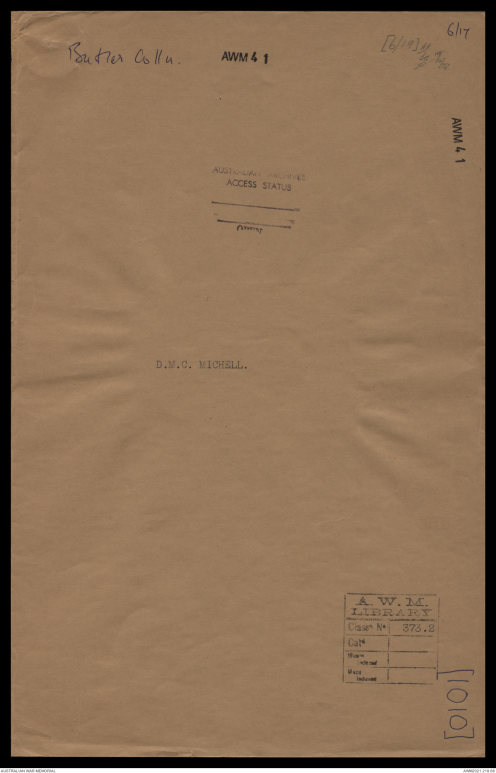
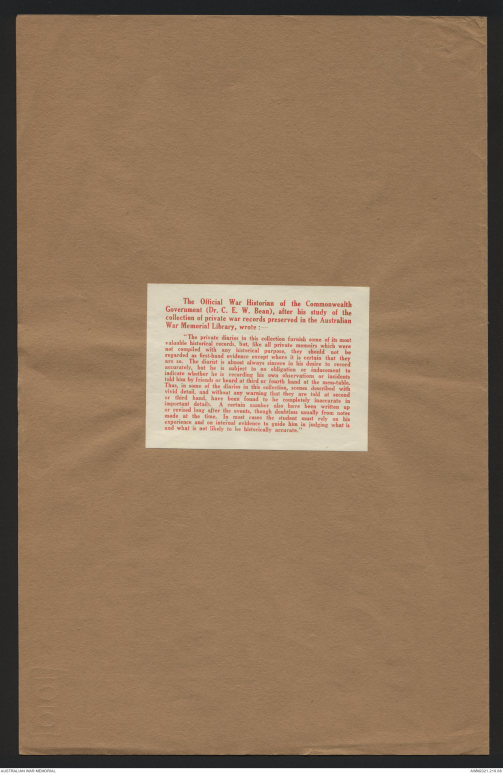
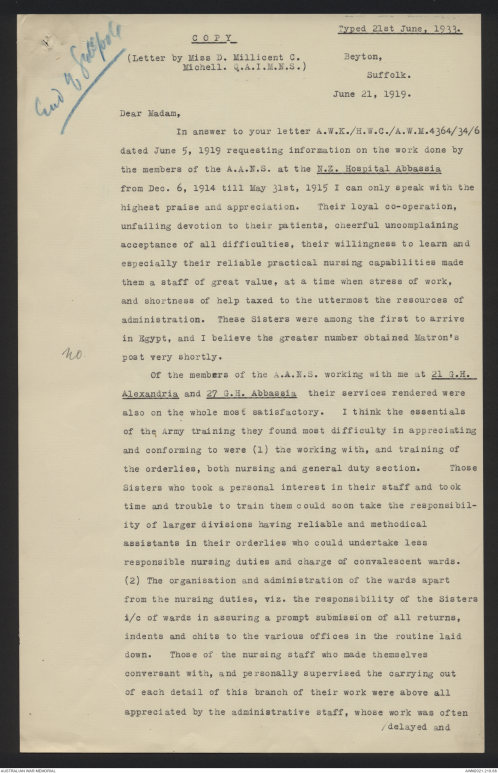
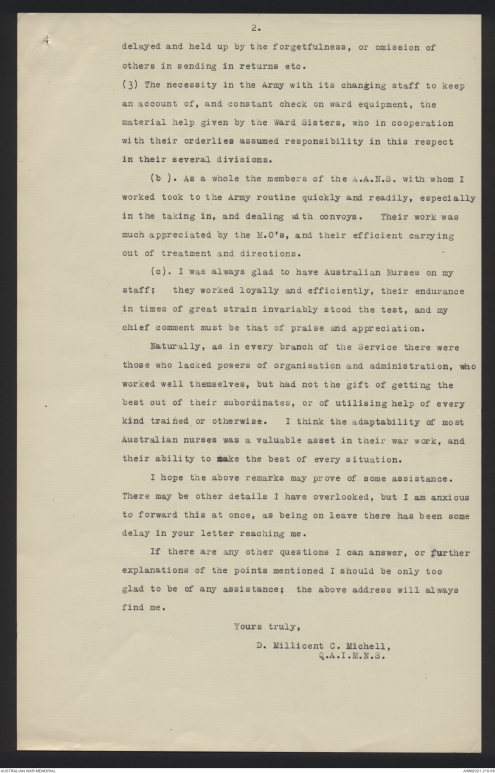
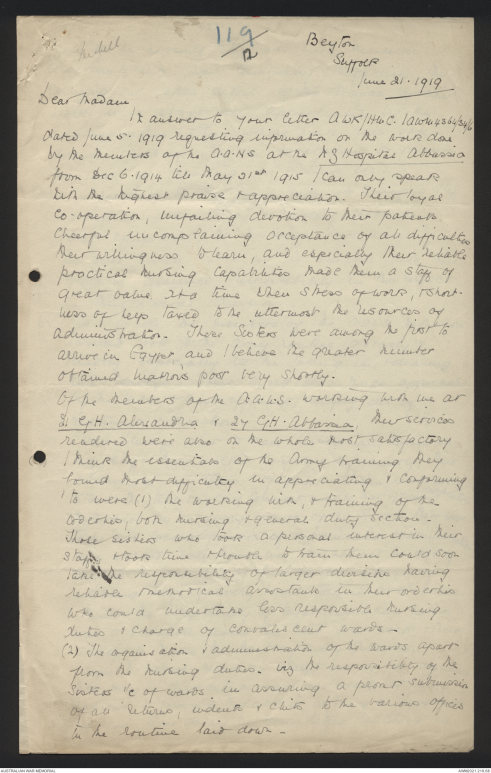
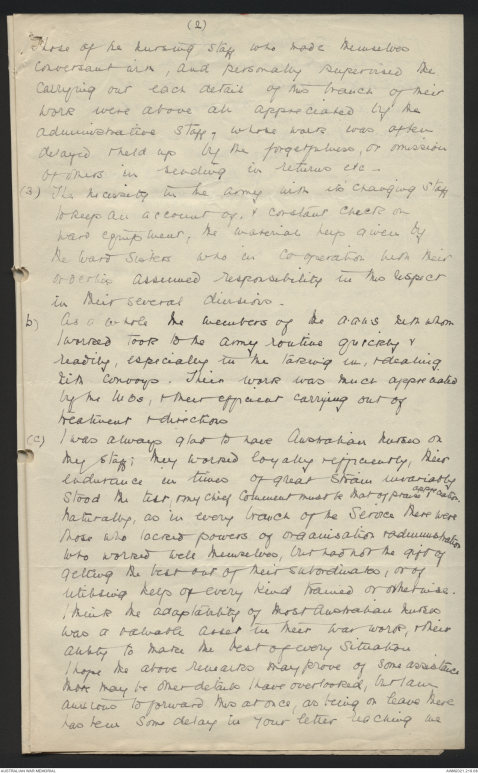
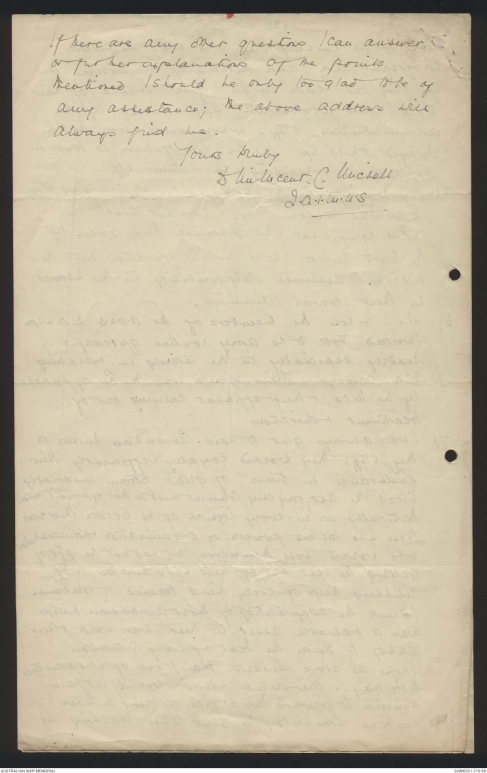
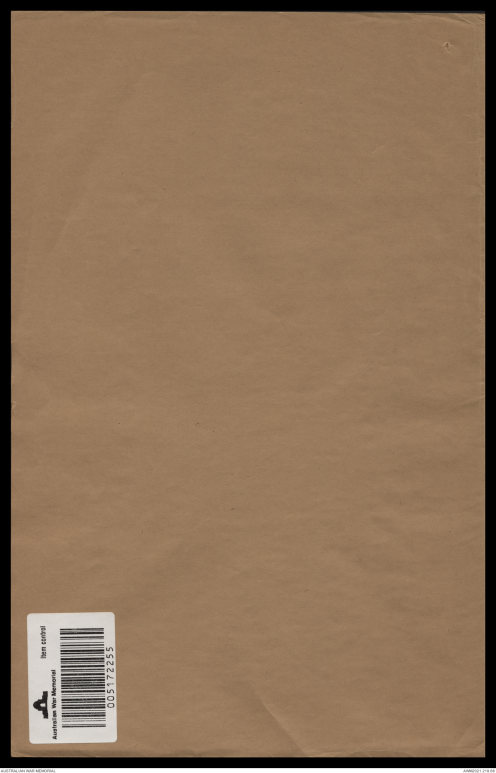
6/17
Butler Colln
AWM 41
[6/19] AA
[[?]] [[?]]
AWM 41
AUSTRALIAN WAR MEMORIAL
ACCESS STATUS
OPEN
D.M.C. MICHELL
A.W.M.
LIBRARY
Classn No 373.2
[[?]]
[[?]]
[[?]]
[1010]
The Official War Historian of the Commonwealth
Government (Dr. C.E.W. Bean), after his study of the
collection of private war records preserved in the Australian
War Memorial Library, wrote:-
"The private diaries in this collection furnish some of its most
valuable historical records, but, like all private memoirs which were
not compiled with any historical purpose, they should not be
regarded as first-hand evidence except where it is certain that they
are so. The diarist is almost always sincere in his desire to record
accurately, but he is subject to no obligation or inducement to
indicate whether he is recording his own observations or incidents
told to him by friends or heard at third or fourth hand at the mess-table.
Thus, in some of the diaries in this collection, scenes described with
vivid detail, and without warning that they are told at second
or third hand, have been found to be completely inaccurate in
important details. A certain number also have been written up
or revised long after the events, though doubtless usually from notes
made at the time. In most cases the student must rely on his
experience and on internal evidence to guide him in judging what is
and what is not likely to be historically accurate."
[*End of Gallipoli*]
COPY
Typed 21st June, 1933.
(Letter by Miss D. Millicent C.
Michell. Q.A.I.M.N.S.)
Beyton,
Suffolk.
June 21, 1919.
Dear Madam,
In answer to your letter A.W.K./H.W.C./A.W.M.4364/34/6
dated June 5, 1919 requesting information on the work done by
the members of the A.A.N.S. at the N.Z. Hospital Abbassia
from Dec. 6, 1914 till May 31st, 1915 I can only speak with the
highest praise and appreciation. Their loyal co-operation,
unfailing devotion to their patients, cheerful uncomplaining
acceptance of all difficulties, their willingness to learn and
especially their reliable practical nursing capabilities made
them a staff of great value, at a time when stress of work,
and shortness of help taxed to the uttermost the resources of
administration. These Sisters were among the first to arrive
in Egypt, and I believe the greater number obtained Matron's
post very shortly.
Of the members of the A.A.N.S. working with me at 21 G.H.
Alexandria and 27 G.H. Abbassia their services rendered were
also on the whole most satisfactory. I think the essentials
of the Army training they found most difficulty in appreciating
and conforming to were (1) the working with, and training of
the orderlies, both nursing and general duty section. Those
Sisters who took a personal interest in their staff and took
time and trouble to train them could soon take the responsibility
of larger divisions having reliable and methodical
assistants in their orderlies who could undertake less
responsible nursing duties and charge of convalescent wards.
(2) The organisation and administration of the wards apart
from the nursing duties, viz. the responsibility of the Sisters
i/c of wards in assuring prompt submission of all returns,
indents and chits to the various offices in the routine laid
down. Those of the nursing staff who made themselves
conversant with, and personally supervised the carrying out
of each detail of this branch of their work were above all
appreciated by the administrative staff, whose work was often
/delayed and
2.
delayed and held up by the forgetfulness, or omission of
others in sending in returns etc.
(3) The necessity in the Army with its changing staff to keep
an account of, and constant check on ward equipment, the
material help given by the Ward Sisters, who in cooperation
with their orderlies assumed responsibility in this respect
in their several divisions.
(b). As a whole the members of the A.A.N.S. with whom I
worked took to the Army routine quickly and readily, especially
in the taking in, and dealing with convoys. Their work was
much appreciated by the M.C's, and their efficient carrying
out of treatment and directions.
(c). I was always glad to have Australian Nurses on my
staff; they worked loyally and efficiently, their endurance
in times of great strain invariably stood the test, and my
chief comment must be that of praise and appreciation.
Naturally, as in every branch of the Service there were
those who lacked powers of organisation and administration, who
worked well themselves, but had not the gift of getting the
best out of their subordinates, or of utilising help of every
kind trained or otherwise. I think the adaptability of most
Australian nurses was a valuable asset in their war work, and
their ability to make the best of every situation.
I hope the above remarks may prove of some assistance.
There may be other details I have overlooked, but I am anxious
to forward this at once, as being on leave there has been some
delay in your letter reaching me.
If there are any other questions I can answer, or further
explanations of the points mentioned I should be only too
glad to be of any assistance; the above address will always
find me.
Yours truly,
D. Millicent C. Michell,
Q.A.I.M.N.S.
Michell 119/12
Beyton
Suffolk
June 21 1919
Dear Madam,
In answer to your letter A.W.K./H.W.C./A.W.M.4364/34/6
dated June 5, 1919 requesting information on the work done
by the members of the A.A.N.S. at the N.Z. Hospital Abbassia
from Dec. 6, 1914 till May 31st, 1915 I can only speak
with the highest praise and appreciation. Their loyal
co-operation, unfailing devotion to their patients,
cheerful uncomplaining acceptance of all difficulties,
their willingness to learn and especially their reliable
practical nursing capabilities made them a staff of
great value, at a time when stress of work, & shortness
of help taxed to the uttermost the resources of
administration. These Sisters were among the first to
arrive in Egypt, and I believe the greater number
obtained Matron's post very shortly.
Of the members of the A.A.N.S. working with me at
21 G.H. Alexandria & 27 G.H. Abbassia their services
rendered were also on the whole most satisfactory.
I think the essentials of the Army training they
found most difficulty in appreciating & conforming
to were (1) the working with, & training of the
orderlies, both nursing & general duty section.
Those Sisters who took a personal interest in their
staff & took time & trouble to train them could soon
take the responsibility of larger divisions having
reliable methodical assistants in their orderlies
who could undertake less responsible nursing
duties & charge of convalescent wards.
(2) The organisation & administration of the wards apart
from the nursing duties, viz. the responsibility of the
Sisters i/c of wards in assuring prompt submission
of all returns, indents & chits to the various offices
in the routine laid down.
(2)
Those of the nursing staff who made themselves
conversant with, and personally supervised the
carrying out each detail of this branch of their
work were above all appreciated by the
administrative staff, whose work was often
delayed & held up by the forgetfulness, or omission
of others in sending in returns etc.
(3) The necessity in the Army with its changing staff
to keep an account of, & constant check on
ward equipment, the material help given by
the Ward Sisters, who in cooperation with their
orderlies assumed responsibility in this respect
in their several divisions.
b) As a whole the members of the A.A.N.S. with whom
I worked took to the Army routine quickly &
readily, especially in the taking in, & dealing
with convoys. Their work was much appreciated
by the MOs, & their efficient carrying out of
treatment & directions.
(c) I was always glad to have Australian Nurses on
my staff; they worked loyally & efficiently, their
endurance in times of great strain invariably
stood the test, and my chief comment must be that of praise & appreciation.
Naturally, as in every branch of the Service there were
those who lacked powers of organisation & administration,
who worked well themselves, but had not the gift of
getting the best out of their subordinates, or of
utilising help of every kind trained or otherwise.
I think the adaptability of most Australian nurses
was a valuable asset in their war work, & their
ability to make the best of every situation.
I hope the above remarks may prove of some assistance.
There may be other details I have overlooked, but I am
anxious to forward this at once, as being on leave there
has been some delay in your letter reaching me.
If there are any other questions I can answer,
or further explanations of the points
mentioned I should be only too glad to be of
any assistance; the above address will
always find me.
Yours truly,
D. Millicent C. Michell,
Q.A.I.M.N.S.
Item Control
Australian War Memorial
005172255
 Sam scott
Sam scottThis transcription item is now locked to you for editing. To release the lock either Save your changes or Cancel.
This lock will be automatically released after 60 minutes of inactivity.